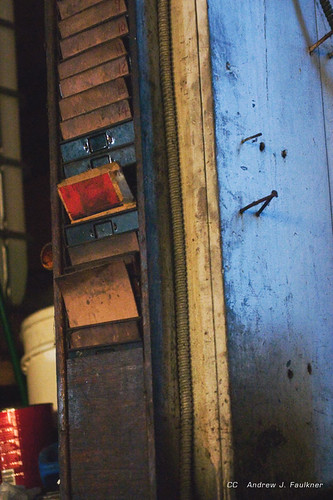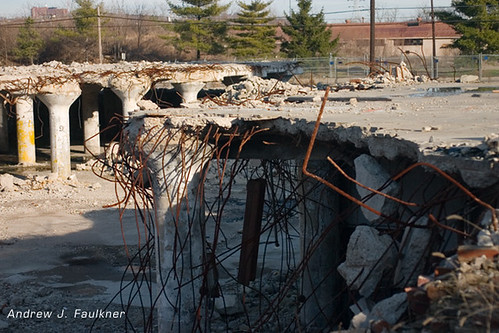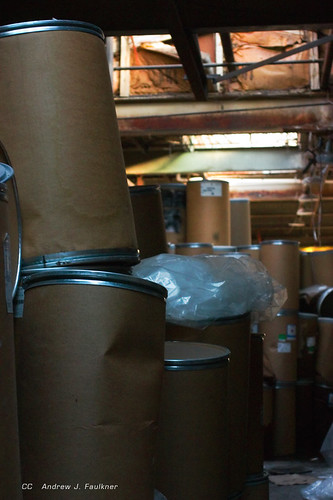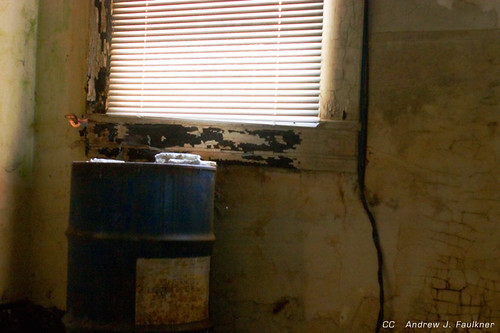On either side of the viaduct are dozens of small factories and warehouses that, having been abandoned by their original proprietors, have been amalgamated into the sprawling Lower Price Hill complex of the Queen City Barrel Company. Queen City recycles the eponymous 55 gallon drums whether steel, aluminum, cardboard, or plastic. Plastic and paper drums are shredded (uncleaned) and sold back as raw material and metal drums are placed in an incinerator to flare off the content before being sanded and repainted. (This might be the only case of recycling being less ecological than disposal!) Due to the undesirable nature of the work, excepting the management, the workforce is in entirety composed of Mexicans of dubious legality. In 2004 a large building containing stored drums burst into flames and the resulting massive fire and pollution plume forced large evacuations suspiciously only hours after the company sold the land to the city....
During my visit I observed a huge jumble of drums in the building immediately adjacent to the viaduct piled to the ceiling and in danger of collapse. These drums had formerly contained both ammonium tetrachloride and pre-made salsa mix. The city of Cincinnati has purchased the entire complex for redevelopment and Queen City's tenure will allegedly only extend until April. The second building I shot in was supposed to be completely vacant, yet contained several palettes of mysterious aluminum drums labeled in Japanese. At this point it became clear that despite numerous agreements the company was at least engaged in covert action in blatant violation of their promises to vacate if not more serious crimes with the suspicious fire a year before.
The complex is spread piecemeal among dozens of former manufacturing facilities spread on either side of the viaduct and we continued on to a building that was formerly a knife factory. It was a double height space again stacked to the ceiling with blue barrels in a rambling maze-like pattern. In the back a gang of Mexicans was disposing the barrels in a large shredder. As we stepped in we knew something was different. Before I got a photo off my throat began to burn. I put on my p-100 respirator. Even that did not seem to help matters and in the end I never got more than ten feet in from the sidewalk. But then again the owner has assured reporters that the company fulfills federal standards so we should have all just breathed easy. In any case we quickly left and I still find myself thinking about those poor Mexican laborers working without respirators in those conditions for 10 or 12 hours a day. But for the owners it is cheaper and easier to just dispose of the workers when they inevitably develop debilitating respiratory conditions rather than even attempting to make the minor outlay to look after their well-being. In a country with our abundant wealth such actions are not only incredibly immoral, they hint at a pervasive corrosiveness undermining our supposedly cherished principles of life and liberty.
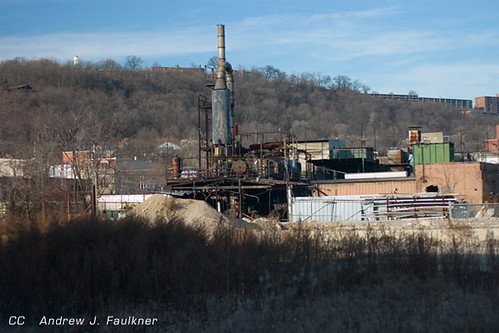
(Allegedly Mothballed Incinerator)
Up the street is the incinerator which again is supposed lie cold; however the palettes of shiny barrels awaiting paint and dirty barrels awaiting flaming belie the clandestine night burnings Queen City still engages in. Such is life in Cincinnati: the government ignores industrial transgressions and puts business profits ahead of the health and well-being of its residents. This echoes a common story from twenty years ago when Proctor and Gamble blatantly continued to fire excess chemicals off in their incinerator down the street for nearly a decade after being ordered to cease; somehow no one with authority managed to connect the noxious haze the settled every morning at dawn over the entire valley with the region's largest employer.
So the next time some silver spoon-fed pundit or hack politician suggests that we should deport the Mexicans and build that ludicrous wall because there are plenty of Americans who would gladly reclaim their jobs, just remember the poor workers at Queen City Barrel and countless other such businesses whose very lives are being sacrificed at the altar of insignificant overhead. Many of them may not live long enough to see their families join them or their children make a better life than they have done.
The American dream of course only applies to its official citizens -- and then only the politically connected ones.

